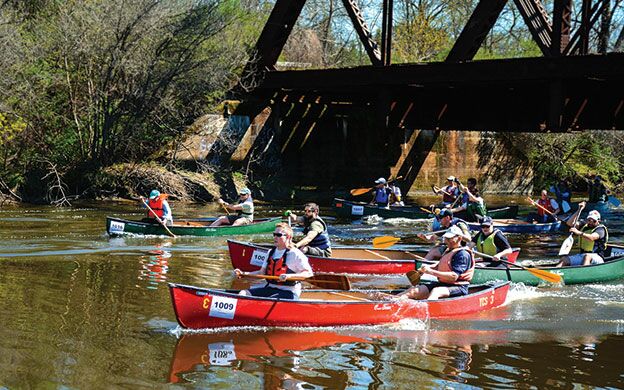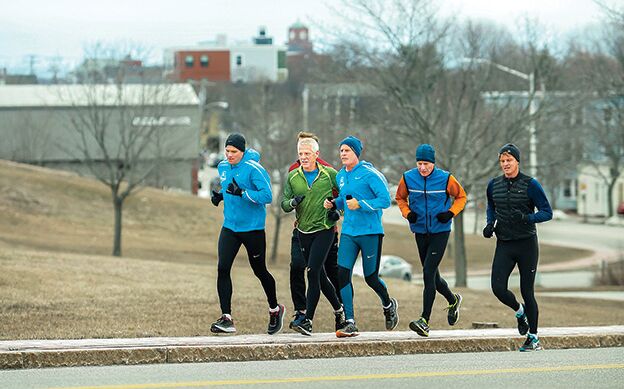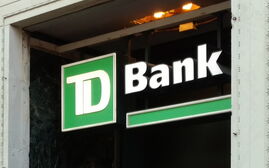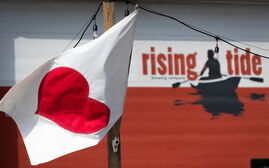Corporate teams blend work and (hopefully) fun
The TD Beach to Beacon 10K, founded by Olympic Marathon Gold Medalist Joan Benoit Samuelson, a Cape Elizabeth native, is one of Larry Wold's favorite days of the year.
“There is an energy and an excitement around the starting line of an event like this that's kind of indescribable,” says Wold, the Maine state president for TD Bank, the event's title sponsor. “You can't help but feed off the energy and enthusiasm of the whole crowd.”
The first race debuted in 1998 with 2,408 runners crossing the finish line. The 2016 race drew almost 6,500 runners from 15 countries and 43 states along with thousands of spectators and 800 volunteers. Since its inception, the event has raised $570,000, distributed by the TD Charitable Foundation, for Maine charities.
But, as corporate challenges become more widespread, there's a another key factor that goes with the charitable giving: team building.
About 10% of Beach to Beacon participants run as part of the Business to Business Challenge.
“It's been interesting to get people to understand that they don't have to be trained, competitive runners to be part of the corporate challenge,” says Wold. “We've had a number of people feel intimidated by it. But we love to have their involvement, whether they're running competitively or casually.”
Fostering fun, keeping employees healthy
The corporate sports challenge appears to be growing in popularity in Maine as an opportunity to foster teamwork in the workforce in a fun and healthy setting.
One of the nation's largest such events is the J.P Morgan Corporate Challenge, which last year had 255,270 participants from 7,677 companies in 16 road races in seven countries, according to the company's website. J.P. Morgan's view is that competing collectively adds team-building aspects that appeal to corporate leaders and encourages new runners, building connections and relationships outside the office.
Maine has a growing number of events.
SailMaine's Corporate Regatta, held off the Portland waterfront, is in its sixth year. In Yarmouth, the 2nd Annual Run of the Royal is a canoe relay for eight-person company teams. Like Beach to Beacon, both of those are growing in participation, drawing companies interested in participating in community events and offering their employees a fun and healthy outing — an extra, invigorating layer to the suite of team-building and health and wellness programs many companies have in place.
Yet it's not about the competition. Although there are always naturally competitive employees who will go for the gold, others are casual participants in the sport, or even novices who might need a bit of persuasion to give it a try. It's more about the “team” part of the event — having fun together in a healthy environment outside of the workplace, breaking down barriers of job titles, getting to know each other, boosting awareness of the fit and healthy lifestyle, and having a common experience to schmooze about back at the workplace.
One runner's journey
Wold of TD Bank got into running when he was a kid.
“People who have only known me as an adult are often surprised to hear that I started running in high school because I was quite overweight,” he says. “I was very self-conscious, so I started running. And I really never looked back.”
Today, he runs, on average, five days a week, roughly 30 miles a week. At TD Bank, 50 to 60 employees a year have taken part in B2B's corporate challenge since its inception. Among them, Wold says, he's been delighted to see first-timers.
“I would venture to guess that, every year that we have done this, we've had at least one employee for whom it was the first race they'd ever done,” he says. “It gave them the motivation they needed to say, 'OK, I've been meaning to do this and now I'm going to do it.' I have friends who have won the Maine race and friends who have run a personal best in this race. But you don't ever see from them what you see in somebody who crosses the finish line for the first time ever, and you see they're hooked and this will change their lives.
“That's what drew me to running in the first place, and I have a lifetime of seeing how running benefits me. So to see these people take that on has really been rewarding.”
'How's your training going?'
At Portland-based Seafax, 10 to 12 of the company's approximately 90 employees take part in Beach to Beacon, says David Weatherbie, the firm's treasurer, secretary and operational overseer. Weatherbie is also the former race president for Beach to Beacon and an avid runner, tallying about 50 miles a week.
“I enjoy it because I love to run and the event takes place in my hometown,” Weatherbie says. “I always have a huge smile on my face come race morning, and I'm very encouraging of and encouraged by employees from my company who participate in the event. I'm always checking in with people before the race: 'How's your training going?' And after the race, asking 'How did it go?' For me, there's a sense of pride.”
Seafax fields a mix of race veterans — like Weatherbie, who finishes the run in under 40 minutes — and less serious runners who might take well over an hour to reach the finish. Most, he says, participate with a personal goal in mind, and they end up exercising more to prepare for the event.
“It's an event people look forward to,” he says. “They set a goal and get out there and ramp up their exercise program. The race happens and then shortly after you hear runners say, 'That was an amazing experience. I'm going to train harder next year.'”
That culture of exercise contributes to the success of the business, he says.
“We have some employees who tend to work out during lunchtime,” he says. “When they come back from working out, their energy level stays higher throughout the day. They're invigorated, and that translates into being more productive.”
Sailing with 'collaborative spirit'
At the law firm Verrill Dana, attorney Ben Ford says he chooses his crew for the SailMaine Corporate Regatta with a collaborative spirit in mind. Ford is an enthusiastic boater who joined the firm shortly after the regatta's first race, in 2009. Verrill Dana has participated in the regatta from the start, and Ford has been a booster ever since.
“The first thing I do is find people who have never sailed before or have limited experience. I try to put people from different departments together,” he says. “The first thing they always say is, 'I don't have any sailing experience.' I say, 'I don't care.' It's a great bonding experience. People have to pay attention to the boats around them, listen to commands and work together.”
Sailboat racing can be intense, says Ford.
“Last year, we had howling winds, which makes for very exciting races,” he recalls. “When there are a lot of boats on the start line and a lot of wind, you have boats moving at full speed within a foot of each other and everyone's yelling at each other and there's water splashing around and most people on the boats don't know what's going on. Somehow everyone gets across the line and everyone has a good time.”
The experience is invaluable, he says.
“You can interact with your coworkers outside of the business environment and get to know who they are as people,” Ford says. “The important thing about sailing in particular is that everyone has to work together to achieve something. It doesn't matter what the rankings are in the business world. When you're on a boat, you're working together. It's an incredibly powerful and poignant experience. And when people come back after the races, they're talking about something other than work and that demonstrates the beginning of a common bond, which lasts all year round.”
Takes two to paddle a canoe
The 2nd Annual Run of the Royal, which benefits the Royal River Conservation Trust, a community-based nonprofit land trust, has that same spirit of throwing people together.
“While a few of the employee relay teams are jacked paddlers with Kevlar toys, most of the entrants are businesses supportive of the community who are offering to pay for a team-building event for local employees who are novice paddlers,” says Executive Director Alan Stearns. “It's an opportunity for companies or other groups to pull their team together and let people have fun at their own speed. Some people win by placing first and some people win by laughing. A lot of times, the best thing we can do for health and exercise is show people how to enjoy an outdoor experience. It ended up being great for morale and teamwork, having a sunny day on the river with a lot of splashing and lot of good, healthy competition.”
Hancock Lumber fielded a team last year and will return this year, says General Manager Harland Storey, who already enjoyed kayaking and canoeing, with the Royal River one of his favorite spots.
Storey notes canoeing is a relaxed form of exercise.
“It's just a group of enthusiastic employees who want to enjoy a morning on the water,” he says. “We weren't by any means practicing and trying to win.”
The Brentwood Center for Health & Rehabilitation in Yarmouth also fielded a team in Run of the River. Kimberly Duest, a registered nurse and Brentwood's director of nursing services, spoke to the event's health benefits.
“I think it opens their eyes to some of the resources in the area as far as what outdoorsy activities there are,” Duest says. “It brings you more in touch in with the community. Mentally, it's invigorating and it's nice to take a break from everyday stresses. When it's physically challenging, you're getting exercise that's good for your heart. But I think the camaraderie is the best part, because all of our jobs today are high-stress and demanding and it helps when you can let some of that stress go.”













Comments